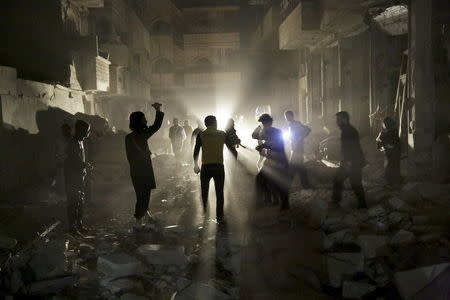Syrian opposition says U.N. talks, Iran involvement harm Syria

By Tom Miles GENEVA (Reuters) - Syria's main political opposition told U.N. Syria envoy Staffan de Mistura on Thursday he was harming the Syrian people by holding wide-ranging consultations on Syria's future, and especially by involving Iran. In a letter seen by Reuters, the National Coalition for Syrian Revolutionary and Opposition Forces said his plan to hear the views of more than 40 groups "would not lead to the desired objectives and may have a negative impact on your mission and the role and credibility of the United Nations." "This would also reflect negatively on the Syrian people and exacerbate their suffering," said the letter, delivered to De Mistura in Geneva by Haitham al-Maleh, a veteran human rights campaigner who heads the coalition's legal committee. Despite its reservations, the coalition said it was willing to work with De Mistura, and invited him to meet in Istanbul next month. De Mistura has adopted a cautious approach to the talks, avoiding raising expectations that this latest initiative can end a conflict which has so far defied all diplomatic efforts to resolve it. He has said he wants to talk to diplomats, activists and political and military leaders to see if there is any new common ground since the Geneva Communiqué, a roadmap for ending the war, was agreed in 2012. Despite having only tenuous links with fighters on the ground and being seen as out of touch with the general population, the National Coalition remains one of the main parties in international discussions to end the four-year-old civil war that has killed 220,000 and displaced millions. The decision of the National Coalition's president Khaled Khoja to decline the personal invitation to Geneva is the second snub this week for the U.N. process. In a separate letter, 30 armed groups opposed to President Bashar al-Assad rejected De Mistura's process, accusing him of being biased and not offering a clear solution. Both letters objected to the involvement of Iran, which has not signed the Geneva Communique and has not been included in two previous U.N. attempts to stop the Syrian war. Inviting Iran, which was "occupying Syria and inflicting suffering on its people" was deeply damaging, the National Coalition's letter said. "Iran, further, continues to provide the regime with the means of killing and destruction and fuels cross-border terrorism through militias deployed in Syria." (Reporting by Tom Miles; Editing by Tom Heneghan)

